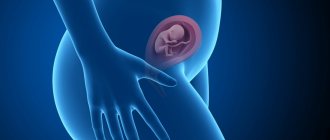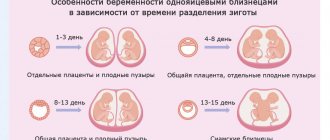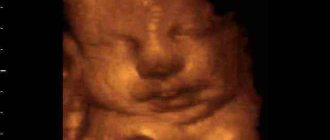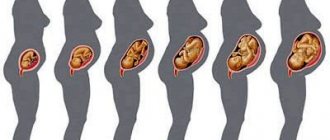Interesting Facts
| Options | Indications |
| Time from conception | 7 weeks |
| Period by month | 9 weeks |
| What month | 3 |
| Dimensions and weight of the fetus | 20-25 mm, 4 g |
| Uterus dimensions | About 9 cm across |
| Pregnant weight | -/+ 2 kg |
Your baby is the size of
Cherry
20-25mm Size
4 g Weight
You are 9 weeks pregnant. The development of the fetus occurs rapidly, and the expectant mother’s feelings change from day to day. The child's body takes on human shape. The embryonic period has ended, and now doctors will call the baby a fetus. The uterus is now twice as large as before pregnancy. Some women's bellies begin to round. Let's find out what else happens to the baby and mother during this period? Let us only note that we are talking about the obstetric method of counting. If you are interested in the 9th week of pregnancy from conception, take a look at the 11th week page on our calendar.
Mother's condition
An important difference from the eighth week is the beginning of feeding the fetus through the umbilical cord. Therefore, the ninth week is characterized by toxicosis in a woman, as well as the manifestation of changes in culinary preferences. There is nothing surprising in the fact that you want pickles with cocoa, strawberry jam or herring.
Until the 9th week, nutrition was not provided through the umbilical cord, so such desires for food were not observed. From this time on, the child receives all the substances his body needs only from the mother. The fetus needs vitamins and minerals, which are found in completely different foods. Therefore, a pregnant woman sometimes wants completely incompatible products.
Due to the fact that the baby’s nutrition depends on the mother, her body gives all the substances necessary to the fetus. Therefore, the skin may become thinner, the hair may become dry, weak, and thin. During exercise, varicose veins may appear due to vasodilation. To strengthen the walls of blood vessels, you need to take vitamin C.
During this period of pregnancy, a pregnant woman notices an increase in urination. It occurs as a result of the load on the kidneys becoming double. The enlarged uterus also puts pressure on the bladder.
Also, the expectant mother experiences sudden changes in mood, increased susceptibility, and sensitivity. These processes are explained by the action of hormones. By week 10 everything should be back to normal.
It is quite possible to experience a feeling of pressure on the bladder. This occurs because the size of the fetus increases. The mother’s body also begins to supply useful substances for breastfeeding after the birth of the baby. Therefore, the woman’s weight increases slightly. Therefore, you should update your wardrobe a little so that old things do not cause embarrassment and discomfort.
Feelings of the expectant mother
You may still experience morning sickness or unexpected taste cravings. Even the most energetic women can feel tired in the morning. Mood swings are also considered a sign of pregnancy. All this occurs due to the fault of progesterone, the concentration of which increases during gestation. Because of it, the chest now hurts, since the mammary gland is preparing for lactation.
Another hormone, relaxin, relaxes the ligaments of the pubic symphysis and pelvic bones. In the future, this will make childbirth easier, but now it leads to pain in the pelvis and lower back, as well as disturbances in intestinal motility. For some, this will manifest itself in the form of constipation, while for others, on the contrary, it will lead to diarrhea. This is temporary and can be corrected with diet.
The size of the uterus is comparable to the size of a grapefruit. The volume of circulating blood increases. Therefore, by week 9 you could gain 1.5-2 kg.
Twelfth week for baby
The twelfth week ends the first trimester of pregnancy. By the end of this period, the length of the fetus is 90 mm, and its weight is approximately 20 g. At this time, many significant events occur in the life of the fetus.
He has an intensive development of the brain, the formation of connections between the spinal cord and the cerebral hemispheres. When you look at the structure of the brain, it resembles a smaller version of the adult brain. Throughout the first months, there were only red blood cells in the fetal blood, but in the twelfth week leukocytes, which are protectors of the body and belong to the immune system, are added to them.
The digestive tract also develops. The liver, which at this stage is the most developed organ and occupies most of the abdominal cavity, begins to produce bile, and not only provide hematopoiesis, as it was before. It is from the twelfth week that the intestines actively grow and begin to fit into loops, which can later be seen in an adult. The first peristaltic movements occur, i.e. contraction of the intestinal muscles, which should in the future ensure the movement of food through it. The fetus, starting this week, swallows amniotic fluid, and it passes through the intestines. This happens before birth. Peristaltic waves are a workout for the intestinal muscles.
In addition, the fetus undergoes rhythmic muscle movements, which are also training and imitate breathing. The glottis is tightly closed, so amniotic fluid is not able to penetrate the respiratory organs.
The fetus's kidneys begin to function, urine collects in them in small portions and exits through the urethra, ending up in the amniotic fluid.
At the twelfth week, the formation of the placenta is completed, and it becomes capable of functioning independently. The placenta is the most important organ for the fetus; through it, not only does the exchange of nutrients occur between the woman and the fetus. The placenta is an effective protector against internal and external toxins.
How the fetus develops
An embryo of 9 weeks is already a fetus, since all organs and systems are formed in it. In the following months they will grow and develop, new ones will no longer appear.
The baby has arms, legs and fingers. On the face you can distinguish the mouth, nose, eyes and eyelids. The tail completely disappeared, it was replaced by the tailbone, and the genitals were formed. The size of the fruit is comparable to a cherry. It contains 20-25 mm and 4 grams. The baby already knows how to swallow, move his limbs, and turn his head.
The development of internal organs is also in full swing:
- the intestines grow, the liver, spleen and gall bladder are formed;
- nerve ganglia, pituitary gland and cerebellum are formed;
- lymph nodes function, the first lymphocytes are produced;
- The thyroid gland and adrenal glands begin to work.
I am a warm wave of love
My baby!
You are making your first independent movements!
Your arms and legs have grown a little, and your feet and fingers have lengthened. Your head takes on its usual shape, your neck develops. I don’t know yet whether you are a boy or a girl, but I love you simply because you exist. The most important thing is that you develop into a healthy baby. And I surround you all with a feeling of happiness. It is important for me that you feel this feeling from the first moments of your life, even before birth. This makes my desire to give health and strength to every cell of yours even stronger.
I don’t feel your movements with my eyes, but a feeling of tenderness overwhelms me when I think and imagine that you, like a little fish, are waving your tiny arms and legs, like fins, in me, and I give you peace and happiness.
I think about you a little every day. I lower my hands to my stomach and breathe in and out slowly. Like an ocean, I slowly roll them back and forth, turning them into warm waves of love.
“The Miracle of a New Life” is a coloring book for expectant mothers from psychologist, best-selling author of books for mothers Tatyana Aptulaeva and illustrator Alena Ustinova.
Tests and ultrasound
During the first trimester of pregnancy, a woman must undergo a whole list of appointments: from testing for blood type and Rh factor to testing for various types of hepatitis and HIV. Every visit to the gynecologist now includes measurement of blood pressure, weight and abdominal circumference.
Routine ultrasound is performed in the second trimester. At week 9, ultrasound is prescribed according to indications. With its help, you can determine a single or multiple pregnancy, the condition of the placenta, and listen to the fetal heartbeat. In case of alarming symptoms, ultrasound helps in diagnosing frozen pregnancy or threatened miscarriage.
How to prepare for an ultrasound examination

To perform such an examination, you need to have a referral from a gynecologist, which indicates the reason for the woman’s need for an ultrasound. You should also take your pregnancy passport, towel, and diaper with you. The results of tests or previous instrumental studies must also be attached to the passport (pregnant woman’s card).
The ultrasound report will be given to the woman; it must be attached to the chart and shown to the observing obstetrician-gynecologist. It is better to come to the examination itself not on a full stomach in order to feel more comfortable. If you have increased gas formation, you should take a few drops of safe medications (Sab Simplex, Espumisan).
What to discuss with your doctor
- If you have a voracious appetite, are drawn to strange combinations of foods, or even want to eat something inedible, tell your gynecologist about this: perhaps this is a symptom of a lack of any microelements or vitamins in the body.
- Find out when your first pregnancy screening will be scheduled. This usually happens before 13 weeks.
- If you are concerned about unusual vaginal discharge, you should report it to a specialist. In the early stages, pregnant women are predisposed to infectious diseases of the genitourinary system.
Surveys
A pregnant woman at eight weeks should already be registered. If for some reason this didn’t work out before, don’t hesitate to start it now. Even in the seventh obstetric week, the doctor had to order tests: hCG, ECG, gynecological examination, consultations with specialists. After the pregnant woman undergoes these tests, doctors will tell her what to do next, depending on her condition. Sometimes genetic counseling may be necessary. Doctors say that it is necessary if hereditary diseases have been observed in the family, and the recommendations of the Moscow Department of Health “How to give birth to a healthy child” state: “Check with your parents what childhood infections you suffered from and what schedules you were vaccinated according to. In addition to your health, find out what your relatives have been and are suffering from... Based on the data you provide, your doctor will draw conclusions about the degree of risk of any hereditary pathology in your unborn child” [2].
Possible complications at 9 weeks
Timely medical care helps maintain pregnancy in 90% of cases. Be attentive to your feelings and do not hesitate if alarming symptoms appear.
Pain
Moderate pain is acceptable in the early stages: the uterus grows, ligaments and tissues stretch, causing spasm. Back pain can also bother a woman. In this case, a relaxing massage, gymnastics, and a warm bath help.
Sometimes after physical activity, a woman may feel as if her stomach is turning to stone. This is due to the tone of the uterus. If there is a strong pull in the lower abdomen and lower back, and the feeling does not go away even after taking no-shpa, you should seek medical help.
What should the discharge be like?
Normally, vaginal discharge is light, colorless, and odorless. Curdled white or yellow ones are a possible symptom of thrush and other infectious diseases to which a woman is exposed during pregnancy.
The appearance of pale pink, scarlet, spotting brown discharge should be especially alarming. This may result in a threatened miscarriage, a frozen pregnancy, or a retrochorial hematoma in the uterine cavity. You should immediately contact a gynecologist.
ARVI during pregnancy
Due to a general decrease in immunity, a pregnant woman is susceptible to colds. Before the epidemic season, it is better to get a flu shot in advance. It is safe and will protect you from complications. Do not suffer from ARVI on your feet; even if you feel slightly unwell, it is better to stay at home. The temperature can be reduced with paracetamol, which is approved during pregnancy.
Alarming symptoms
In the early stages, the fetus is especially vulnerable to various types of problems. Yes, some unpleasant symptoms that may begin during the first trimester are normal, but some should warrant an urgent visit to the doctor. Some conditions may indicate a risk of losing the child or threaten the mother herself.
Brown discharge
. During pregnancy, there are no periods or similar discharge, with rare exceptions. When implantation occurs, a woman may notice a small amount of brown marks, but this goes away quickly. And if they are abundant, appear frequently, are accompanied by unpleasant sensations, have a strange smell or contain streaks of blood, you need to urgently consult a specialist.
Bleeding.
It may indicate a threat of miscarriage (detachment of the ovum), ectopic pregnancy and other dangerous conditions. Normally, there should be no bleeding during pregnancy; this is a serious symptom that should never be ignored.
Increased body temperature.
When a woman is pregnant, her temperature naturally rises slightly, to around 37 degrees. If this happens all the time, that's normal. But a sharp jump and high readings on the thermometer are an alarming sign. Even an ordinary ARVI in the first trimester can harm the child, and many sources talk about illnesses during pregnancy as a dangerous factor and recommend taking care of vaccination [2]. And if there are no signs of a cold or other infection, but the temperature is still rising, this is an indication for an urgent visit to the doctor: the reason may lie in problems with pregnancy.
Nagging pain in the lower abdomen
. Some types of pain during pregnancy are normal and are associated with the fact that the uterus is stretched and organs are displaced. The norm is considered to be short-term painful sensations that go away if you sit down and rest. But if the lower abdomen hurts and constantly pulls, cramping sensations appear, the pain is severe and causes discomfort, notify your doctor. This may indicate a pathology of pregnancy or a threat of miscarriage.

Do's and Don'ts
The ninth week of pregnancy is a period when the fetus is actively developing, so it is especially sensitive to external influences, and the expectant mother needs to take care of herself. Stop smoking and alcohol, and have less contact with household chemicals. Do not lift more than 3-5 kg.
Intimate life
Sex at 9 weeks is not contraindicated during normal pregnancy. On the contrary, it improves the psycho-emotional state of a woman and improves blood circulation. You should refuse intimacy if there is a threat of interruption, if there is increased tone of the uterus and if the mother is not feeling well.
Physical activity
There is an opinion that sports are contraindicated during pregnancy. But this is a misconception. Moderate physical activity strengthens muscles, improves mood, and develops endurance, which will definitely come in handy during childbirth. Pregnant women are recommended to swim, do yoga or Pilates, and walk.
Fear of pregnancy
The doubts that arise when learning about pregnancy are similar. Often they are associated with a number of obstacles that prevent you from freely and joyfully accepting a child into your life. How can you help overcome these difficulties?
- Try to leave thoughts like: “But if there was no child, then this would be the case, and I (or we) could do this and that...” This is all conditional mood. But in reality, YOU ALREADY HAVE A CHILD. And there are still 9 months to calm down, accept this fact, prepare for the birth of the Baby and provide him with a favorable start in life.
- Analyze and honestly answer yourself, without hiding behind general words, what exactly scares you about the fact of having a child. The most common reasons for a child’s “unwantedness” are financial difficulties, difficult relationships with the child’s father and his reluctance to accept the fact of paternity, early pregnancy and an unsettled life, career plans that the child does not fit into, unwillingness to bear responsibility, and fear of losing independence. As a rule, future parents are well aware of what they are losing with the birth of a child, and have no idea what they are gaining.
- Try to imagine how your child feels, because despite the fact that he is still very tiny, he is able to react to impulses coming from you and even imprint them. And it’s better if his first impression of this world is “they’re waiting for me, I’m welcome,” and not “the dearest people don’t need me.”
- Forgive yourself all your doubts and... wait until the 18-20th week of pregnancy - this is the period when many expectant mothers change their attitude towards what is happening.
- There is an opinion that Baby will always understand his future mother and help her - he is always at one with his mother. Thus, the famous Canadian psychologist and philosopher Liz Burbo advises talking to your Baby, explaining to him what is happening to you, imagining how he listens, what he might think and what he would answer to his mother. Don’t worry about the fact that your baby still feels, understands, and worries differently than adults. Remember that only you can convey joy, sadness, anxiety to him now, you can calm him down and even (!) cheer him up.
Checklist for the ninth week of pregnancy
- It's time to take care of a new bra: your breasts are enlarged and may become engorged, so choose natural fabrics and models designed for pregnant women.
- To cope with constipation, drink enough fluids and eat foods high in fiber: vegetables, fruits, whole grains.
- Do not get out of bed abruptly in the morning: this way you will avoid dizziness.
If you still have questions related to the well-being of the mother and baby in the ninth week of pregnancy, you can consult a gynecologist at the Women’s Medical Center at any time convenient for you. Appointments are available 24 hours a day.
Eleventh week for baby
The fetus continues to grow rapidly in the eleventh week. Externally, it looks like this: a fairly large head, small legs pressed to the tummy, a small torso and well-developed long arms. This uneven development is due to the fact that throughout the entire previous period it was the upper part of the body, in which vital organs such as the heart and brain are located, that received the bulk of nutrients and oxygen.
The fetus continues to form joints and bones and grow muscles. Not only large joints develop, but also small ones. The rudiments of teeth form in the jaws, and nails form on the fingers.
The movements of the unborn child become more and more purposeful. Loud sounds and sudden movements begin to provoke a response from him. Grasping and sucking reflexes develop - this can be seen by the movement of the fingers and lips. The formation of olfactory and taste receptors begins. If amniotic fluid enters the nose or mouth, the fetus is able to taste it.
At this stage, the formation of the iris of the eyes also occurs, which after birth will determine their color. In most cases, newborns have blue or blue eyes; brown ones are quite rare. The final color of the iris is formed by five months. It depends on the accumulated melanin pigment located in the iris. Genetic inheritance determines the amount of this pigment.









